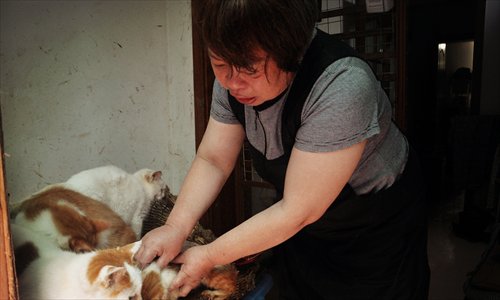

He Yukuan looks after some of her cats. Photo: Huang Lanlan/GT
It is 5 am and early riser 63-year-old He Yukuan is cleaning her house. This takes a major effort every day. In her small apartment near Liziyuan Station on metro Line 11 He and her son reside - along with 20 cats and five dogs.
Some of the animals sleep on a wooden couch, some are sitting on the floor, some are hiding behind wardrobes. The home has the unmistakable smell of animal excrement even though she tries to keep it clean and tidy.
"The people upstairs often come here and complain about the smell," He admitted.
Her animals are strays and her life is largely taken up with stray animals. Every day after she finishes two hours of house cleaning she goes out to feed the stray cats and dogs in the nearby communities. She hasn't had a holiday outside Shanghai for years. "Nobody would look after the animals if I left home."
A costly pastime
The strays outside and at home cost He not only time but money. She estimates she spends some 1,500 yuan ($241.65) a month on animals - more than half her monthly pension. Daily she steams a big pot of rice with fish and chicken livers for the cats and dogs. When the Global Times visited her lunch was a simple plate of vegetables and tofu.
"Many say I am a fool but I don't care." She has been a "fool" for nearly 20 years now. The first stray animal she adopted was a white and yellow cat she found in 1995. She took the little cat home and it made her very happy. From then on, He began taking in hungry or injured stray animals.
Over the years she has adopted more than 80 cats and dogs, feeding them, cleaning them - she even learned how to administer vaccinations. If the animals are sick or injured she takes them to veterinarian clinics or calls a veterinarian in.
But though the stray cats and dogs have brought her happiness and a sense of achievement, there are many problems involved in this charitable mission.
Bites and scratches are part of her life. Like the time she was trying to rescue a little tabby cat stranded on a flyover and mewing for hours. She placed some food in front of the little animal but instead of eating it gratefully it suddenly leapt up and bit her savagely on the hand.
One of the dogs she keeps at home is a small mustard-colored crossbred called Beibei. It was tied to the sofa and although He loves it the dog does not like everyone else. It has bitten her son twice and, in 2008, when builders were rebuilding her backyard, it bit a worker which meant she had to pay the man a tidy sum in compensation. "A tetanus injection can cost 900 yuan," she said.
Last year He faced a crisis. Her husband was diagnosed with esophageal cancer and was taken to hospital. She described him as a kind man who helped her care for the strays. But as he lay stricken with the disease in hospital, He and his family spent most of their savings on his treatment. And He no longer had time to look after her pets.
She contacted some of the city's animal protection organizations to ask for help but to her surprise they all rejected her requests for assistance. "They wanted to charge me for looking after my cats and dogs - 300 yuan to look after a cat for a month, and 400 yuan for a dog," she said. "I couldn't afford that. I had to save money for my husband."
Fortunately one of her cat-lover friends agreed to look after He's 10 cats, asking her for just 200 yuan a month. She then had to send her two favorite dogs, Beibei and Gougou to private kennels for five months and fed the others herself, snatching time from her husband's bedside and hospital to journey home and attend to them.
Her family argued with her and criticized her over this decision but she felt she had no choice even though it made her feel guilty. "I had adopted these animals and I didn't want to abandon them."
Seeking help
During the hard times, and after her husband passed away, He thought of seeking help on the popular microblogging website Weibo - although she had no computer skills. But He, with her simple middle school education, soon worked out how to use Weibo and began posting stories about her strays and her problems in caring for them.
LifeYoYo was one of the animal protection groups that offered practical assistance although rather than adopting and feeding stray cats and dogs, this nonprofit intermediary agency connects stray animal rescue organizations with people who want to adopt pets.
"When there is a group looking for a new home for a stray cat it has saved, and there is someone wanting to adopt a stray cat as a pet, they come to LifeYoYo to meet each other," Yin Yawei, LifeYoYo director, told the Global Times.
Established in April 2012, LifeYoYo started China's first stray animal adoption website pet.lifeyoyo.com one month later. Thirteen leading animal rescue organizations in Shanghai regularly give it information about the cats and dogs they have saved, and LifeYoYo posts these details including a photo of the animal and its age, gender, strain and physical condition.
The group does not charge for its services. "And if I found a group was charging people for adopting a stray cat or dog, I would not use its details again," Yin said.
Copyright ©1999-2018
Chinanews.com. All rights reserved.
Reproduction in whole or in part without permission is prohibited.